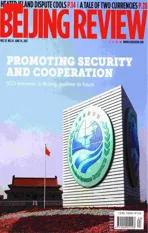THIS WEEK
2012-10-14
THIS WEEK
“Fundamentally, the improvement of air quality relies on our own efforts, while it is beyond foreign embassies’ capability and willingness.”
Chinese Deputy Foreign Minister Cui Tiankai, responding to foreign embassies’ monitoring and issuing of air quality data for fine particles in China, in an interview with Hong Kong-based Phoenix TV on June 13
“We wanted to show with actions in our country that we do not need the paralyzing protection of others.”
Italian Prime Minister Mario Monti, declaring that Italy does not need a bailout from its European partners during a Senate briefing in Rome on June 13
“We are now in the early stages of the project to build nuclear submarines. In view of the advances we are making in the related areas, we hope that we will see the use of nuclear submarines by the navy in the future.”
Rear Admiral Abbas Zamini, Deputy Commander of the Iranian Navy, in an interview with the semiofficial Mehr News Agency in Tehran on June 12
“It’s unfair to students from rural areas who have never seen an iPhone or iPad. If the [people who set the questions for] gaokao need to be more creative, why not include [a question about] breeding pigs and sheep?”
Li Yi, a professor at Beihang University in Beijing, accusing exam chiefs in Sichuan Province of discriminating against rural students by including references to Apple Inc. and micro-blogging in this year’s national college entrance exam in his microblog on June 9
Human Rights Plan
The Chinese Government on June 11 publicized its second National Human Rights Action Plan, promising to address challenges and work for the happiness and dignity of every citizen.
The new plan, which addresses human rights protection work in 2012-15, was published by the State Council Information Office and follows the previous one that covered the 2009-10 period.
In an interview with Xinhua News Agency, Wang Chen, Minister of the State Council Information Office, said that the major points of the action plan are as follows: providing protection for citizens’ economic, social and cultural rights; providing protection for citizens’ civil and political rights; providing protection for the rights of ethnic minorities, women, children, senior citizens and the disabled; conducting education on human rights; fulfilling obligations to international human rights conventions; and participating in international exchanges and cooperation on human rights.
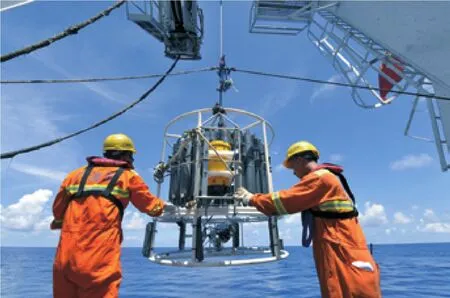
DEEP DOWN Crew members aboard China’s Haiyang-6 research vessel retrieve a surveying device from the Pacific Ocean on June 11, in preparation for dive attempts by the country’s deep-sea submersible, the Jiaolong, at the Mariana Trench between mid-June and early July. The Jiaolong will attempt theworld’s deepest manned submersible dive by going 7,000 meters under the sea surface
China will enforce preventive and remedial measures to prevent extraction of confessions by torture and collecting evidence through illegal methods, the document says.
It also pledges that no one will be forced to prove themselves guilty.
The action plan also contains targets such as helping 13 million disabled people obtain rehabilitation through the implementation of key rehabilitation programs, increasing citizens’ average life expectancy so that it will reach 74.5 years by 2015 and the coverage of affordable housing will reach 20 percent.
First Golf Major
Chinese golfer Feng Shanshan won the Ladies Professional Golf Association (LPGA) Championship on June 11 to become the first Chinese player to win an LPGA Tour title and a major event, closing with a 5-under 67 for a two-stroke victory.
Born in 1989, Feng started playing golf at an early age. She has invested all her spare time in training. She joined the Guangdong Youth Team at the age of 10 and took part in international youth competitions at 14. She won the China Women’s Amateur title when she was 15. She started her career as a professional player in 2008 when she became the first registered player of the China Golf Association to join the LPGA tour. So far, she has ranked among the top 10 of all kinds of competitions for 17 times and won a prize money of nearly $2 million.
The championship really goes beyond Feng’s expectations. “I still cannot believe that I have won a major,” said Feng.
Many foreign media compared Feng’s victory with that of Chinese tennis player Li Na at the French Open. BBC even predicted that China’s golf players would amount to 20 million in 2020 boosted by Feng’s success.
“I hope this will help the development of this sport in China,”Feng said.

Food Safety Campaign
A week-long publicity campaign was launched on June 11 in China to promote honesty in the food industry after a series of food safety scandals.
Under the theme of “building a homeland with moral integrity and strengthening food safety,” various departments at all levels around the country held activities to show the results of their work in strengthening food safety and cracking down on major food safety cases.
Moreover, activities were held to raise food producers’ and dealers’ awareness of relevant laws and regulations, as well as boost their level of honesty and enhance their credibility.
Market Cleanup
The Ministry of Commerce (MOFCOM) said on June 13 that China reported fewer cases of making and selling counterfeits from January to April this year due to consistent law enforcement activities.
Chang Xiaocun, Director of the Market Order Department with the MOFCOM, revealed that 78,773 cases involving intellectual property rights (IPR) infringement and counterfeits were investigated in the four months.
During the period, people dealing in fake goods worth 1.81 billion yuan ($287.3 million) were probed in a concerted effort to crack down on copyright infringement and counterfeiting, according to Chang.
He said that government departments would continue to clamp down on violations pertaining to trademarks, copyrights and patents while strengthening supervision over the sales of medicine, cosmetics, farming materials and auto parts.
Tibetan Heritage
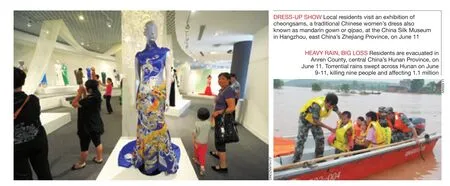
Cultural specialists in southwest China’s Tibet Autonomous Region have found more than 100 pages of Tibetan scripture that dates back to the 13th century, local authorities said on June 13.
The document, whose content covers traditional Tibetan medicine and religion, was found at a monastery in Nyemo County on the outskirts of Lhasa.
“The document was compiled during the Yuan Dynasty (1271-1368),” said Pempa Tsering, a Lhasa-based specialist on ancient Tibetan literature.
The finding was among a total of 853 cultural heritage pieces uncovered in Lhasa over the past year, local cultural authorities said.
Palace Museum Counting
Beijing’s Palace Museum has catalogued its entire collection of 1,807,558 artifacts, the museum’s curator Shan Jixiang said.
After more than seven years of efforts, the museum has catalogued all of the artifacts in its archives, including about 53,000 paintings, 75,000 calligraphy works, 16,000 pieces of copperware and 10,000 sculptures, said Shan on June 9.
The Palace Museum, built in 1420 in the heart of Beijing, is more popularly known as the Forbidden City.
Statistics show that more than 312 million people have visited the Palace Museum since 1949. The number of annual visitors jumped from 1 million in 1949 to 14 million at present, putting the Palace Museum among the world’s most popular museums.
It became a UNESCO World Heritage Site in 1987.
Climate Research Facility
China on June 11 announced the establishment of a national research center designed to facilitate the country’s efforts to cope with climate change.
Xie Zhenhua, Vice Minister of the National Development and Reform Commission (NDRC), said at the center’s launching ceremony that it would provide technological support for China’s efforts to map out a climate change plan.

The National Center for Climate Change Strategy and International Cooperation, which will serve as a window for international cooperation, will conduct research in the fields of strategic planning, laws and regulations, international policy, carbon markets and information consultancy, according to the NDRC.
China has made several efforts, including fiscal measures to promote the efficient use of energy, to cope with rising environmental challenges.
The government plans to cut greenhouse gas emissions by 40 to 45 percent compared with 2005 levels by 2020, as well as boost the use of renewable energy to 15 percent of the country’s total energy consumption.
Foreign Labor Rules
The Chinese Government issued new regulations for the management of foreign labor service enterprises to protect workers sent overseas and boost the development of foreign labor cooperation.
The regulations will go into effect on August 1.
Foreign labor service enterprises will each be required to create a bank account containing no less than 3 million yuan ($47.62 million) to be deposited in banks designated by authorities in order to cover potential risks, according to the new rules.
The funds will mainly be used to cover service fees, wages, compensation for losses and emergency expenses when labor service enterprises fail to pay.
Foreign labor service companies should help workers protect their legal rights, the regulations said, adding that companies will be obliged to provide compensation that foreign employers fail to provide.
Inflation Falls
China’s inflation eased to a 23-month low, providing ample room for the government to boost economy.
The consumer price index (CPI), a main gauge of inflation, slowed to 3 percent in May from a year ago, said the National Bureau of Statistics (NBS) on June 9. It weakened from 3.4 percent in April and 3.6 percent in March.
Compared with the previous month, the CPI edged down 0.3 percent, which was mainly attributable to food price decreases.
Food prices, which account for nearly one third of the weighting in the calculation of China’s CPI, saw a 6.4-percent year-on-year increase in May.
The producer price index (PPI), a gauge of inflation at the wholesale level, fell 1.4 percent in May from a year earlier.
Liu Yuanchun, Vice Dean of the School of Economics at Renmin University of China, attributed the lower-than-expected CPI growth to the waning effects of imported inflation and lackluster domestic demand.
Moreover, he expected the economy to rebound after hitting the lowest point in the year in the second quarter. Domestic demand will then pick up, which could stop consumer prices from falling, but declining global commodity prices will continue to weigh on domestic prices, he said.
Trade Rebounds
China’s foreign trade growth trumped market forecasts to post double-digit rates in May, boosted by slightly improved external markets and more working days in the month.
Exports and imports totaled $343.58 billion in May, up 14.1 percent year on year, rebounding from the 2.7-percent growth in April, said the General Administration of Customs on June 10.
The figure replaced the monthly trade record set in November 2011, when foreign trade amounted to $334.11 billion.
Both imports and exports reached record highs in May, with exports climbing 15.3 percent from a year earlier to $181.14 billion, and imports rising 12.7 percent to $162.44 billion. Trade surplus hit $18.7 billion in May, slightly higher than the $18.42 billion in April.
Improved markets in the United States and Japan, stable growth in emerging economies, as well as less pressure for the yuan to rise further helped boost May’s trade data, said Huo Jianguo, Director of the Chinese Academy of International Trade and Economic Cooperation.
But the country should still be cautious about the long-term trend, Huo said, citing uncertainties with the euro-zone debt crisis.
Lowered GDP Forecast
China’s economic growth will likely moderate to around 8 percent this year amid downward risks caused by the ongoing crisis in Europe, said an official from the International Monetary Fund (IMF) on June 8.
In April, the IMF predicted an annual growth of 8.2 percent for China. David Lipton, First Deputy Managing Director of the IMF, told Xinhua News Agency that the latest revision is still a comfortable growth for China under the current circumstances. PSBC President Investigated
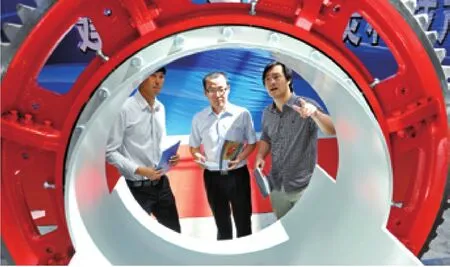
EQUIPMENT SHOW An exhibitor (right) introduces coal mining equipment to visitors at the Eighth China International Exhibition for Energy Industry and Green Technologies in Yinchuan, capital of northwest China’s Ningxia Hui Autonomous Region, on June 11

ASSEMBLING AIRBUS Workers check parts for the 100th Airbus A320 aircraft in the final assembly line in north China’s Tianjin on June 13. The aircraft will be delivered by the end of the year
The Postal Savings Bank of China (PSBC) issued an announcement on June 11, saying that its president Tao Liming is under investigation because of suspicions of “personal economic problems.”
PSBC became a joint stock company earlier this year. It has more than 500 million clients, and its assets exceed 4 trillion yuan ($634.92 billion). It is a commercial bank with the largest number of =branches and the largest network in China. At the same time, it has the fifth biggest pool of deposits among China’s commercial banks and its asset scale increases fastest among Chinese large national banks.
Tao has been the president of PSBC since March 20, 2007. His economic problems are said to be related to “illegal loans.”
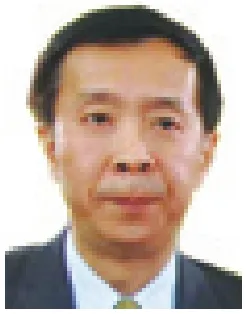
Though it’s hard to tell the impact that the European crisis will have on other countries, it’s important that China and other countries be ready and attentive to the possible outcomes, said Lipton.
China has the space for a forceful response if the world economy further slows and then affects the Chinese economy, stressing that the stimulus measures, if necessary, should align with the goal of quality growth that relies less on investment, more on consumption, and is environmentally friendly, he said.
Boosting Logistics
The National Development and Reform Commission (NDRC) on June 8 published a guideline on offering more support to private investors in the logistics sector.
To ensure fair competition, the guideline pledged a substantial tax reduction for private logistics companies, a more favorable landuse policy and a better financing environment.
The newly adopted guideline specified a list of key logistic areas in which private investors should be encouraged to enter, including medicine and renewable resources delivery, supply chain management and cooperation with state-owned railway logistic companies.
It also welcomed private companies to invest in infrastructures for the logistic industry.
Aircraft Sales
Xi’an Aircraft International Corp. (XAIC) will sell three MA60 regional aircraft to MARS, a Ukrainian-based airline, marking the first time for China-made civil regional aircraft to enter the European market.
The press release issued by the XAIC in June did not disclose the contractual price or the delivery date.
The deal marks a breakthrough in China-Europe cooperation in aviation, said Jiang Jianjun, General Manager of XAIC.
Jiang said the twin-turboprop MA60 aircraft produced by the XAIC have become popular in domestic and overseas aviation markets due to the aircraft’s fuel efficiency.
“Because of rising fuel prices, the fuelefficient turboprop is expected to have bright market potential,” said Jiang.


